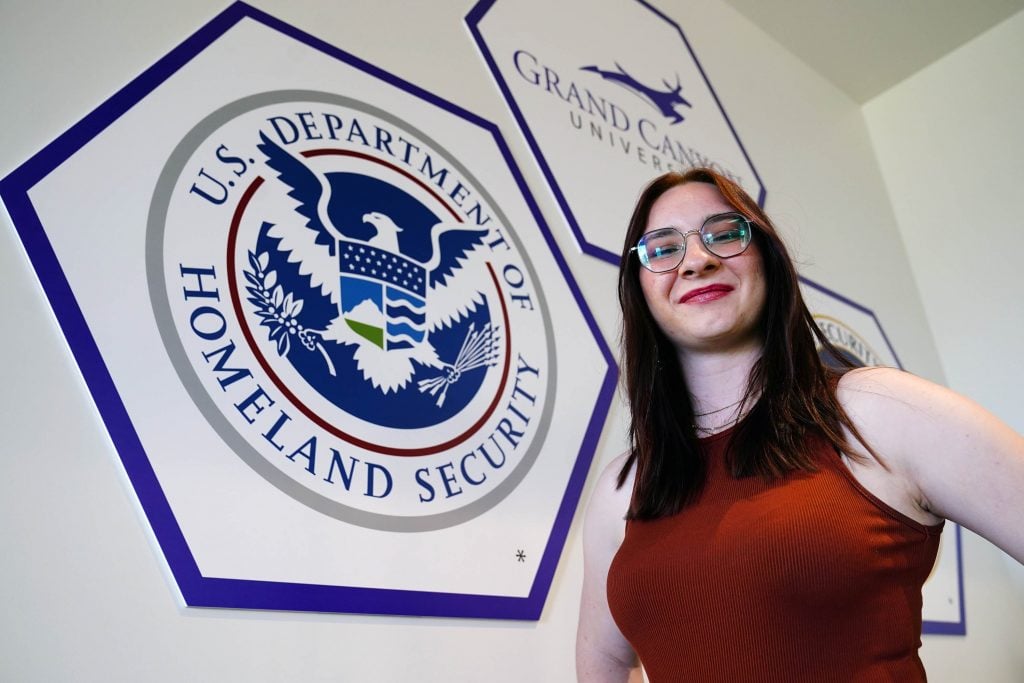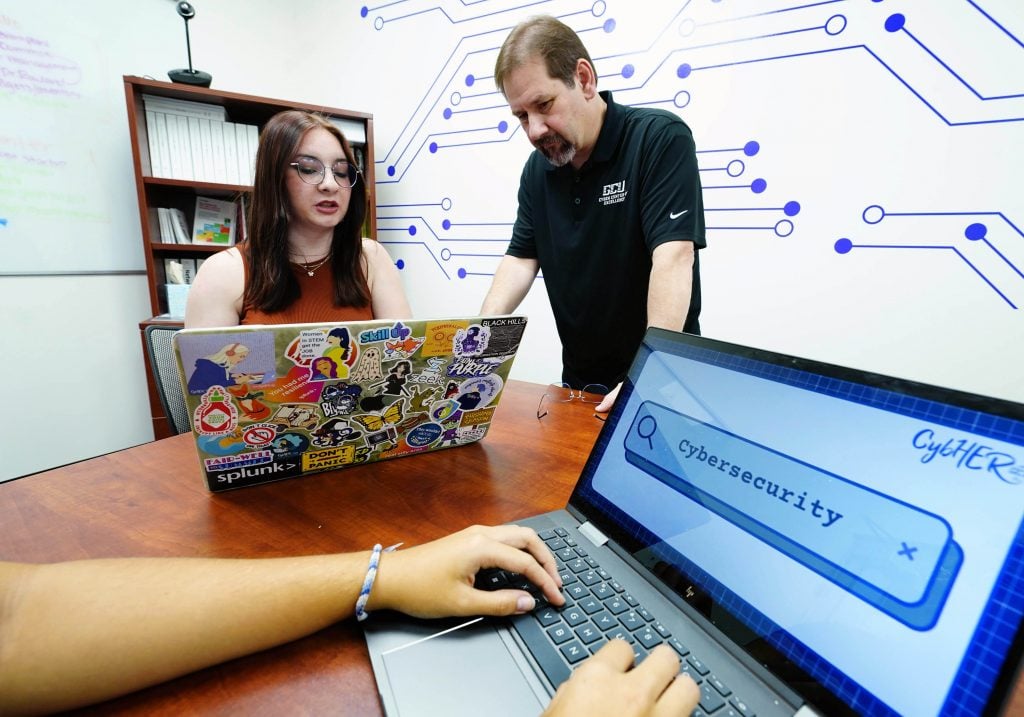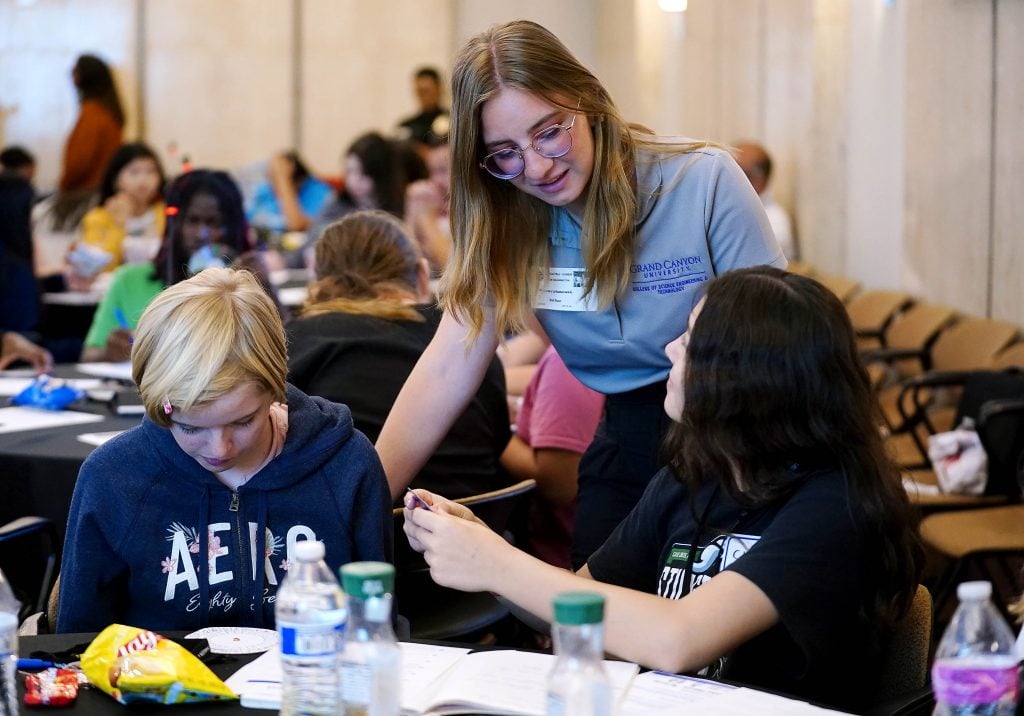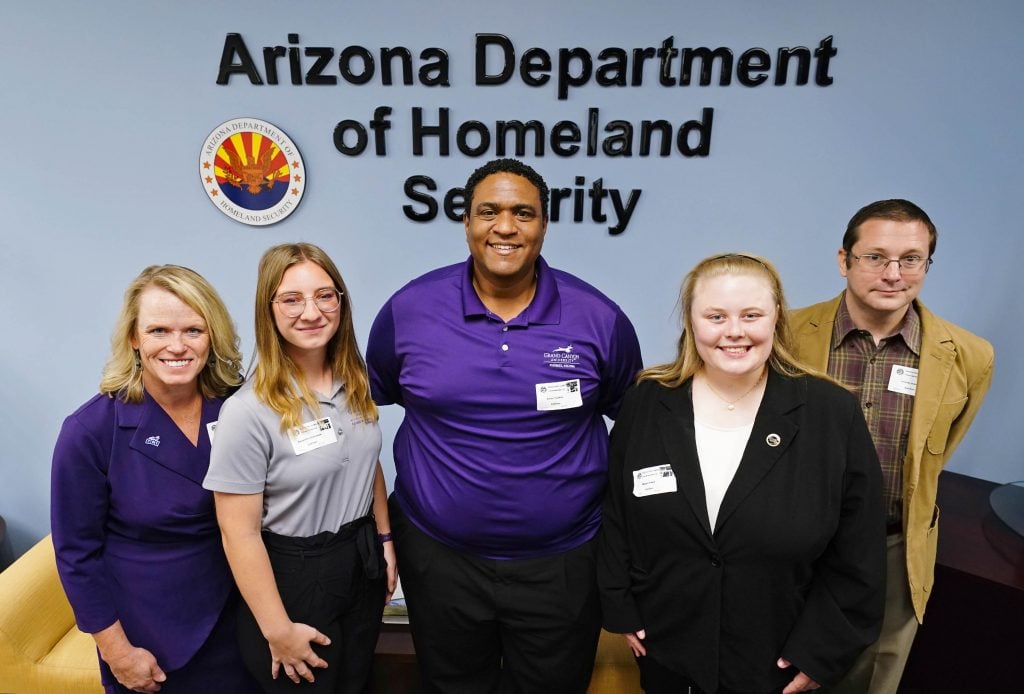
Photos by Ralph Freso
In the realm of keen internships, Alexandra Urbaszewski’s internship with the U.S. Department of Homeland Security is pretty impressive, considering she was right in the thick of things over the summer during the CrowdStrike Microsoft incident that caused one of the biggest IT outages in history.
The Grand Canyon University forensic psychology major and cybersecurity minor, who started working for Homeland Security in April as a project coordinator intern, said GCU faculty was key in helping her land the internship. Representatives of the government agency were on campus for several events and panels, which helped her stay on their radar.
“The connections and events like Coding With My Girls at GCU allowed me to meet my current boss and played a significant role in securing my internship with Homeland Security,” said Urbaszewski, who’s also a student worker at the university’s Cyber Center of Excellence. “I got this internship because I kept introducing myself to the right people, and I kept attending the right events.”
Her internship with Homeland Security has taught her valuable administrative and incident response tactics, like during the botched CrowdStrike update.

She spent the day digging around websites, gathering information and contacts to send to her bosses, who began calling organizations to address security issues.
“I was on for a full eight hours, so we took a full day to calm everybody down. But the rest of my team was online from 11 p.m. through the next day,” Urbaszewski said.
Her father, Joseph Urbaszewski, has worked at the GCU Cyber Center of Excellence for six years and has had a huge impact on Urbaszewski’s interest in cybersecurity, though it pushed her out of her comfort zone.
She was just 14 when she would go with her father and volunteer at the Cyber Center of Excellence, a hands-on facility in the Technology Building where students and community members sharpen their cyber skills by learning how to crack passwords, break into networks and the like.
“He would drive me to work with him, and it made a huge difference on my communication skills,” Urbaszewski said.

Her dad's encouragement gave her the courage to introduce herself to others and overcome her fear of public speaking. After a while, she developed solid communication skills and found a love for the field.
“I was terrified of speaking. I couldn't even talk to a teacher after class, and now I'm going up and speaking in front of groups, speaking on panels, teaching teachers, and just a being a better person overall,” said Urbaszewski, who encourages students to introduce themselves to people, even if it makes them uncomfortable. “You're never going to get anywhere if you do not put yourself out there.”
Before her exposure to cybersecurity, she was interested in investigative work and joining the FBI. Her parents encouraged her to look into cybersecurity.
“We emphasized that in today's digital age, cybersecurity knowledge can be a powerful asset in any field, particularly in investigative work,” her dad said.
Considering Urbaszewski’s fascination with the psychological manipulation that cybercrime victims experience and the human behavior of the person committing the crime, she plans to pursue cybercrime investigation after college.
But for now, she is finishing her second year as the GenCyber student lead at the Cyber Center of Excellence. She sets up events, works with administration, and educates teachers during cyber camps. All that experience has helped her develop high-demand cyber skills, build her resume and make valuable connections.
“The CCE offers tools and experience that students would not encounter in a regular class,” her dad said.

In June, Urbaszewski helped teach approximately 40 K-12 educators the basics of cybersecurity and lessons they can use in their classrooms. The camp focused on how to incorporate more cybersecurity into the curriculum, help spark students’ interest and develop their skills in the industry at an early age.
“We even had a couple from the Navajo reservation, some from as far as Willcox, Tucson, and even one who flew in from South Carolina,” she said.
Despite the demands of her workload, Urbaszewski's passion for cybersecurity drives her to keep moving forward.
"I enjoy both of my jobs, so it doesn’t feel like work most of the time," she said, though she admits that balancing everything isn’t easy: "I’m going to be honest, it’s a struggle.”
She drives home every few weeks to see her parents, which helps her manage stress.
"Rather than having tunnel vision from just focusing on work and school, I make sure I have time for friends and family," she said.
Her favorite part about both jobs is watching the “light bulb” moment when someone understands a cybersecurity concept.
“That moment is HUGE to me – an impact was made on somebody else, and it means they're going to make an impact on others as well,” Urbaszewski said.
GCU student writer Leandra Lepp can be reached at [email protected]
***
October is Cybersecurity Awareness Month
In recognition of Cybersecurity Awareness Month, Urbaszewski encourages individuals to use strong and unique passwords and avoid using the same password across multiple accounts. Instead, create different passwords for each of your accounts.
***
Related content:
GCU News: Insurance program ensured cyber student's job prospects
GCU News: GCU students' lessons in cyber span from from Phoenix to Hawaii



































































